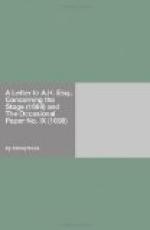As to the First Objection, That the Debauchery of the Town is to be attributed to the Looseness of our Plays and Stage.
If this were true, it is an Objection only against the present Corruption of the Theatre; and is of no force against a regulated Stage; for that admits of nothing Immodest or Immoral.
As to the Second Objection brought from Councils and Fathers, if what is quoted were really design’d by them against the Theatre in general, yet it can have but little effect with the People, I mean the Men of Probity and Learning; for they are not to be mov’d by the Opinions of others no longer than those Opinions are agreeable to Reason: No Man ought to pay such a Respect either to Councils or Fathers, as to submit his Judgment contrary to his Reason. Their saying so in this Case ought to have no more effect with us than if they had at the same time given us their Opinion of the Truth of Transubstantiation.
I think the Matter ought to be disputed by it self; for the Opinion of the Fathers cannot alter the Nature of the Thing. Sir, give me leave to make this Digression: ’Tis my Opinion, even in Matters of Religion, the preaching up the Fathers so much has been of fatal Consequence. If we run out of our selves to search for Truth, we are expos’d to be deceiv’d; and relying too much upon another’s Judgment, may be the occasion of an Errour in our own. A false Quotation or Interpretation by a Man of some Figure, to an easie Credulous Bigot, has been the Conversion of a great many, and of excellent Service in the Church of Rome: They cannot attack any without a Father or Council, and that to a Person who knows nothing of the matter, is as good as a Demonstration. The Fathers were but Men, and as capable to be deceiv’d as others: And I do not know why the Bishop of Worcester may not deserve an equal Esteem; he understands the Languages, and has as much Sincerity as any of them; and why then shou’d he not be able to give the Sense of the Scripture as well.
I have a Veneration for them as good Men, and where their Opinion is a Consequent of true Reason, it ought to be embraced; but where ’tis not, I need not say it ought to be rejected; and I think any Man may be allowed to dispute whether it be so or no. The Bishop of Worcester cannot publish a Book, but you’ll have an Answer to it. It would indeed be of Reputation to the Councils and Fathers, some of them at least, if what were objected against




